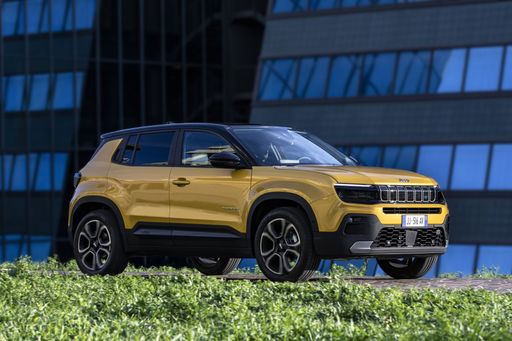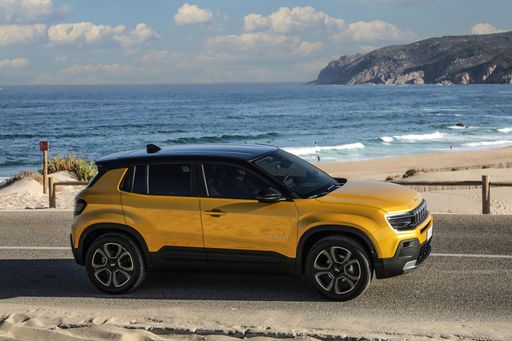Hyundai Tucson vs Jeep Avenger - Differences and prices compared
Compare performance (288 HP vs 156 HP), boot space and price (20900 £ vs 21900 £ ) at a glance. Find out which car is the better choice for you – Hyundai Tucson or Jeep Avenger?
Costs and Efficiency:
When it comes to price and running costs, the biggest differences usually appear. This is often where you see which car fits your budget better in the long run.
Hyundai Tucson has a slight advantage in terms of price – it starts at 20900 £ , while the Jeep Avenger costs 21900 £ . That’s a price difference of around 1045 £.
Fuel consumption also shows a difference: Hyundai Tucson manages with 2.70 L and is therefore convincingly more efficient than the Jeep Avenger with 4.90 L. The difference is about 2.20 L per 100 km.
As for electric range, the Jeep Avenger performs convincingly better – achieving up to 400 km, about 330 km more than the Hyundai Tucson.
Engine and Performance:
Power, torque and acceleration say a lot about how a car feels on the road. This is where you see which model delivers more driving dynamics.
When it comes to engine power, the Hyundai Tucson has a decisively edge – offering 288 HP compared to 156 HP. That’s roughly 132 HP more horsepower.
In acceleration from 0 to 100 km/h, the Hyundai Tucson is to a small extent quicker – completing the sprint in 7.50 s, while the Jeep Avenger takes 9 s. That’s about 1.50 s faster.
In terms of top speed, the Hyundai Tucson performs hardly perceptible better – reaching 204 km/h, while the Jeep Avenger tops out at 194 km/h. The difference is around 10 km/h.
There’s also a difference in torque: Hyundai Tucson pulls noticeable stronger with 379 Nm compared to 260 Nm. That’s about 119 Nm difference.
Space and Everyday Use:
Beyond pure performance, interior space and usability matter most in daily life. This is where you see which car is more practical and versatile.
Both vehicles offer seating for 5 people.
In curb weight, Jeep Avenger is evident lighter – 1180 kg compared to 1542 kg. The difference is around 362 kg.
In terms of boot space, the Hyundai Tucson offers evident more room – 620 L compared to 380 L. That’s a difference of about 240 L.
In maximum load capacity, the Hyundai Tucson performs distinct better – up to 1799 L, which is about 522 L more than the Jeep Avenger.
When it comes to payload, Hyundai Tucson hardly perceptible takes the win – 545 kg compared to 502 kg. That’s a difference of about 43 kg.
Who wins the race in the data check?
The Hyundai Tucson is decisively ahead in the objective data comparison.
This result only shows which model scores more points on paper – not which of the two cars feels right for you.
Costs and Consumption
View detailed analysis
Engine and Performance
View detailed analysis
Dimensions and Body
View detailed analysis

Hyundai Tucson
Hyundai Tucson
Hyundai Tucson marries bold, sculpted looks with a clever, roomy cabin that feels smarter than its price tag suggests. It's composed on the road, easy to live with day-to-day, and a sensible choice for buyers who want SUV style without the showroom theatrics.
details




Jeep Avenger
The Jeep Avenger shrinks Jeep's boxy, adventurous styling into a city-friendly electric crossover that looks just as at home on tight streets as it does on muddy weekend lanes. It's a savvy pick for drivers who want go-anywhere attitude without the truck-size ego — practical inside, lively around town and ready to tackle a bit of rough stuff when the mood strikes.
details




Costs and Consumption |
|
|---|---|
|
Price
20900 - 47900 £
|
Price
21900 - 36900 £
|
|
Consumption L/100km
2.7 - 7.6 L
|
Consumption L/100km
4.9 - 5.7 L
|
|
Consumption kWh/100km
-
|
Consumption kWh/100km
15.50 kWh
|
|
Electric Range
63 - 70 km
|
Electric Range
400 km
|
|
Battery Capacity
-
|
Battery Capacity
51 kWh
|
|
co2
62 - 172 g/km
|
co2
0 - 129 g/km
|
|
Fuel tank capacity
52 - 54 L
|
Fuel tank capacity
44 L
|
Dimensions and Body |
|
|---|---|
|
Body Type
SUV
|
Body Type
SUV
|
|
Seats
5
|
Seats
5
|
|
Doors
5
|
Doors
5
|
|
Curb weight
1542 - 1893 kg
|
Curb weight
1180 - 1520 kg
|
|
Trunk capacity
546 - 620 L
|
Trunk capacity
325 - 380 L
|
|
Length
4525 - 4535 mm
|
Length
4084 - 4088 mm
|
|
Width
1865 mm
|
Width
1776 mm
|
|
Height
1650 mm
|
Height
1527 - 1541 mm
|
|
Max trunk capacity
1795 - 1799 L
|
Max trunk capacity
1218 - 1277 L
|
|
Payload
518 - 545 kg
|
Payload
494 - 502 kg
|
Engine and Performance |
|
|---|---|
|
Engine Type
Petrol, Full Hybrid, Plugin Hybrid, Diesel MHEV
|
Engine Type
Electric, Petrol, Petrol MHEV
|
|
Transmission
Manuel, Automatic
|
Transmission
Automatic, Manuel
|
|
Transmission Detail
Manual Gearbox, Dual-Clutch Automatic, Automatic Gearbox
|
Transmission Detail
Reduction Gearbox, Manual Gearbox, Dual-Clutch Automatic
|
|
Drive Type
Front-Wheel Drive, All-Wheel Drive
|
Drive Type
Front-Wheel Drive, All-Wheel Drive
|
|
Power HP
136 - 288 HP
|
Power HP
100 - 156 HP
|
|
Acceleration 0-100km/h
7.5 - 11.6 s
|
Acceleration 0-100km/h
9 - 10.6 s
|
|
Max Speed
196 - 204 km/h
|
Max Speed
150 - 194 km/h
|
|
Torque
250 - 379 Nm
|
Torque
205 - 260 Nm
|
|
Number of Cylinders
4
|
Number of Cylinders
3
|
|
Power kW
100 - 212 kW
|
Power kW
74 - 115 kW
|
|
Engine capacity
1598 cm3
|
Engine capacity
1199 cm3
|
General |
|
|---|---|
|
Model Year
2025
|
Model Year
2023 - 2025
|
|
CO2 Efficiency Class
F, D, E, B
|
CO2 Efficiency Class
A, D, C
|
|
Brand
Hyundai
|
Brand
Jeep
|
What drive types are available for the Hyundai Tucson?
Available configurations include Front-Wheel Drive or All-Wheel Drive.




